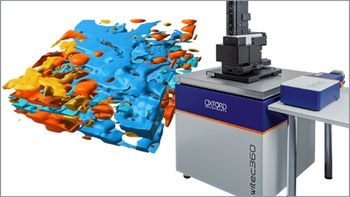
Applying Data-Rich Experimentation Tools to Biocatalytic Process Engineering
Learn how Merck applies in situ FTIR in data-rich experimentation. This webcast highlights past and ongoing efforts centering on enzyme discovery and reaction engineering, underpinned by data-rich experimentation methods including high-throughput experimentation and analysis, automation, and in situ reaction analysis using novel analytical tools. Furthermore, development of a robust process optimized for a commercially relevant synthetic chemistry reactor (vs. for example a more optimal bioreactor or fermenter) will be reviewed including demonstration across scales. Live: Thursday, Aug. 13th, 2020 at 11am EDT | 8am PDT | 4pm BST | 5pm CEST On demand available after airing until Aug. 13th, 2021 Register free
Register Free:
Event Overview:
Recent advances in the biocatalytic retrosynthetic toolbox have transformed the way Merck conceives of novel synthetic routes, particularly for drug candidates with significant structural similarity to naturally occurring biomolecules. This is particularly evident in the development of the biocatalytic route to MK-8591, a nucleoside reverse transcriptase/translocation inhibitor (NRTTI) currently in Phase II clinical trials. Using copper-dependent galactose oxidases (GOases), which are highly efficient enzymes for the mild, regio- and stereoselective oxidation of a broad variety of primary and secondary alcohols, polyols and sugars, the synthetic pathway of MK-8591 represents a ground-breaking application of cascaded biocatalysis for the synthesis of a complex small molecule compound. In this presentation, we will showcase how collaborative efforts across Process R&D are contributing towards building deep, fundamental understanding of the oxidation of 2-ethynylglycerol, a key intermediate in the MK-8591 synthesis. We will highlight past and ongoing efforts centering on enzyme discovery and reaction engineering, underpinned by data-rich experimentation (DRE) methods including; high-throughput experimentation and analysis, automation, and in situ reaction analysis using novel analytical tools, including FTIR. Furthermore, development of a robust process optimized for a commercially relevant synthetic chemistry reactor will be reviewed including demonstration across scales.
Key Learning Objectives:
- How end-to-end automation enables experimental execution and data capture.
- How to ensure reaction performance across scales
- High-density, data-rich, time-course reaction analysis is critical to gaining deep process understanding
Speaker: Shane Grosser, Senior Principal Scientist, Merck
Time and date: Thursday, Aug. 13th, 2020 at 11am EDT | 8am PDT | 4pm BST | 5pm CEST
On demand available after airing until Aug. 13th, 2021
Sponsor: Mettler Toledo
Register Free:
Newsletter
Get essential updates on the latest spectroscopy technologies, regulatory standards, and best practices—subscribe today to Spectroscopy.




